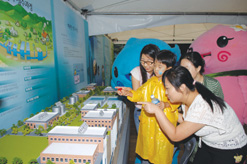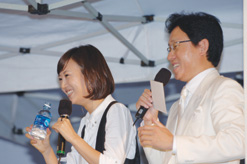Seoul Waterworks Office Strives
to Make 'Arisu'Top-Quality Water
Unveils a five-year plan, calling for replacing all purification plants with advanced treatment facilities
 On September 1, 2008, Seoul City marks the centennial of the city's first supply of Seoul city water at Ttukto purification plant along the Han River. In an effort to cope with changes, including the opening of the domestic water market and to meet rising demands from Seoulites, the Waterworks Office at the Seoul Metropolitan Government under the helm of Assistant Mayor Park Myung-hyun has come up with a five-year tap water vision in celebration of the 99th anniversary of the city's supply of Seoul city on September 1, 2007.
On September 1, 2008, Seoul City marks the centennial of the city's first supply of Seoul city water at Ttukto purification plant along the Han River. In an effort to cope with changes, including the opening of the domestic water market and to meet rising demands from Seoulites, the Waterworks Office at the Seoul Metropolitan Government under the helm of Assistant Mayor Park Myung-hyun has come up with a five-year tap water vision in celebration of the 99th anniversary of the city's supply of Seoul city on September 1, 2007.
The anniversary coincided with the 3rd Arisu Festival designed to increase the public's understanding over Seoul city water, called Arisu. The brand was named after the old name of the Han River called at the time of Goguryeo, an ancient Korean Kingdom. Arisu means a great river or water in view of the historical linguistics of Korean.
Assistant Mayor Park of the Waterworks Office said in an interview with NewsWorld,
 "The Seoul city water business has made strides with the quality of the tap water being upgraded to a world-class level."The Waterworks Office has grown into a financially sound concern with assets worth 4.6 trillion won and 200 billion won in debt, a low debt rate.
"The Seoul city water business has made strides with the quality of the tap water being upgraded to a world-class level."The Waterworks Office has grown into a financially sound concern with assets worth 4.6 trillion won and 200 billion won in debt, a low debt rate.
However, he expressed the hope to prepare for a leap for another 100 years on the occasion of the centennial anniversary next year. He noted that FTA negotiators between Korea and the United States did not discuss the water business, but the EU side is expected to want to take up the drinking water issue during FTA talks with Korea since there are eight to nine world-class water companies in the European Community.
The Waterworks Office plans to implement the five-year plan to make Arisu competitive in the case of opening the domestic water market, Assistant Mayor Park opined.
According to the five-year plan, the Waterworks Office will replace all purification plants with advanced water treatment ones and raise the retrieval rate, or the ratio of charged tap water to 95 percent. The Waterworks Office has set three goals
 - supply of world's top-notch tap water, world's highest retrieval rate and excellent customer service.
- supply of world's top-notch tap water, world's highest retrieval rate and excellent customer service.
The Waterworks Office strives to accelerate a bid to secure its own technology on water treatment designed to produce the world's top-quality tap water. Currently, Korea depends on water treatment technologies imported from foreign countries, so the nation badly needs to secure its own technology designed to solve the nation's unique environmental changes, including the 'green algae phenomenon'that occurs in rivers during spring and autumn, the season with less precipitation. The office plans to develop its own water treatment technology by 2012 and replace all tap water purification plants with advanced ones by 2014.
The office plans to strengthen the quality of Seoul city water and management of the revenue water ratio.
As part of its efforts to solve public worry about the raw water of Seoul city water Seoul City has decided to
 relocate Gui and Jayang plants for drawing raw water to upstream Gangbuk Plant for drawing raw water by 2010. The municipal government is considering moving Pungnap and Amsa plants for drawing raw water to upstream locations. The office monitors the quality of raw water at six raw water drawing plants and 36 locations of the South Han Rive and the North Han River on a weekly, monthly and yearly basis and an ecological warning system is in place to secure the safety of raw water.
relocate Gui and Jayang plants for drawing raw water to upstream Gangbuk Plant for drawing raw water by 2010. The municipal government is considering moving Pungnap and Amsa plants for drawing raw water to upstream locations. The office monitors the quality of raw water at six raw water drawing plants and 36 locations of the South Han Rive and the North Han River on a weekly, monthly and yearly basis and an ecological warning system is in place to secure the safety of raw water.
The Waterworks Office operates the Seoul Water-Now, a real-time water quality management system, designed to help Seoulites confirm the water quality of Arisu.
The latest survey and press reports show that Seoul citizens understand water purifications plants produce clean water, but the problem lies somewhere between the pipeline at home and the faucet.
More than 98 percent of the pipeline in the precincts of Seoul has been already replaced with rust-free pipes. The replacement of the remainder will be 100 percent complete by 2010.
 The office plans to set aside 124 billion won as a budget for providing financial support to citizens who want to get their pipeline at their home replaced during the period between 2007 and 2015. Each household is given a subsidy -- i.e. a maximum of 1.5 million won. Accordingly, the beneficiaries of the project are expected to total 138,000. A total of 10,800 Arisu taps will be installed at 630 schools in Seoul by investing 40 billion won in by 2010.
The office plans to set aside 124 billion won as a budget for providing financial support to citizens who want to get their pipeline at their home replaced during the period between 2007 and 2015. Each household is given a subsidy -- i.e. a maximum of 1.5 million won. Accordingly, the beneficiaries of the project are expected to total 138,000. A total of 10,800 Arisu taps will be installed at 630 schools in Seoul by investing 40 billion won in by 2010.
In an effort to raise the revenue water ratio from 90.7 percent in 2007 to 95 percent in 2012, the world's highest level, the office will take such steps as the development of new leakage-detecting devices and introduction of scientific management methods, including the comprehensive management of underground pipelines via an advanced Geographic Information System (GIS). The latest leakage detectors will be made available, while the office will introduce a system under which those who prove to have capability of detecting are certified.
 The Waterworks Office plans to introduce a system in which each person is assigned to take responsibility for the management of each flow meter by checking and analyzing his or her own flow meter.
The Waterworks Office plans to introduce a system in which each person is assigned to take responsibility for the management of each flow meter by checking and analyzing his or her own flow meter.
The Waterworks Office now makes a regular check into 145 monitored items, equal to the number of items recommended by the World Health Organization to raise public awareness toward safe Arisu. Besides, 118 more items will be put under observation by 2012. Even a small amount of any harmful substance found during the observation will be put on the monitoring list to secure the purification process.
The 3rd Arisu Festival featured diverse events in the front of the Seoul City Hall Plaza at 11 a.m. on September 1 on the occasion of the 99th anniversary of Seoul's first supply of Arisu. The 2007 Seoul Tap Water Technology Symposium touched on the development of advanced purification technologies.
Among the events were the reenactment of the "Bukcheong water seller"during the Chosun Dynasty and a blind test for telling the best among Arisu, mineral water and water being treated by a purifier by tasting each one blindfolded so they had to choose by taste only. nw
(Clockwise) Celebrities participate in a ceremony marking the 99th anniversary of the metropolitan city's supply of Seoul city water on Sept. 1 and the 3rd Arisu Festival. Assistant Mayor Park Myung-hyun of the Waterworks Office at the Seoul Metropolitan Government. Pupils take a look into the whole process of supplying Seoul city water.
A variety of events marking the 3rd Arisu Festival get under way at the Seoul City Hall Plaza on Sept. 1.
3Fl, 292-47, Shindang 6-dong, Chung-gu, Seoul, Korea 100-456
Tel : 82-2-2235-6114 / Fax : 82-2-2235-0799